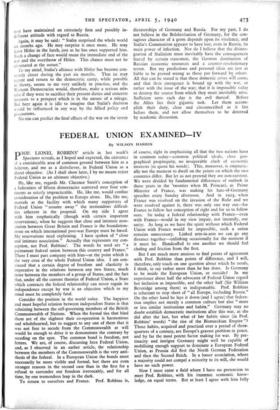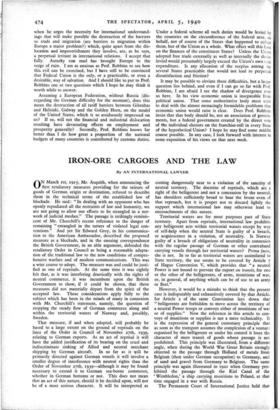FEDERAL UNION EXAMINED IV
By WILSON HARRIS
DROF. LIONEL ROBBINS' article in last week's 1 Spectator reveals, as I hoped and expected, the existence of a considerable area of common ground between him as a believer, and me as a disbeliever, in Federal Union as a direct objective. (As I shall show later, I by no means reject Federal Union as an ultimate objective.) He, like me, regards Mr. Clarence Streit's conception of a federation of fifteen democracies scattered over four con- tinents as utterly impracticable. He, like me, would confine consideration of the problem to Europe alone. He, like me, marvels at the facility with which many supporters of Federal Union " assume away " the tremendous difficul- ties inherent in the proposal. On my side 1 agree with him emphatically (though with certain important reservations), when he suggests that close and intimate asso- ciation between Great Britain and France is the foundation- stone on which international post-war Europe must be based. My reservations need explaining. I have spoken of " close and intimate association." Actually that represents my con- ception, not Prof. Robbins'. The words he used are " a permanent federal union between this country and France." There I must part company with him—at the point which is the very crux of the whole Federal Union idea. I am con- vinced that a certain degree of freedom and elasticity is imperative in the relations between any two States, much more between the members of a group of States, and the fact that, under all the current theories of Federal Union, a State which contracts the federal relationship can never regain its independence except by war is an objection which to my mind must be completely fatal.
Consider the position in the world today. The happiest and most hopeful relation between independent States is that subsisting between the self-governing members of the British Commonwealth of Nations. When the formal ties that bind them are of the slightest their co-operation is harmonious and wholehearted, but to suggest to any one of them that it was not free to secede from the Commonwealth at will would be enough to drive it to demonstrate the contrary by seceding on the spot. The common bond is freedom, not fetters. We are, of course, discussing here Federal Union, and, as I observed in an earlier article, the relationship between the members of the Commonwealth is the very anti- thesis of the federal. In a European Union the bonds must necessarily be more visible and formal, but there are even stronger reasons in the second case than in the first for a refusal to surrender our freedom irrevocably, and for all time, by one tremendous leap in the dark.
To return to ourselves and France. Prof. Robbins is, of course, right in emphasising all that the two nations have in common today—common political ideals, close geo- graphical propinquity, no insuperable clash of economic interests (to quote his words). This, moreover, is emphatic- ally not the moment to dwell on the points on which the two countries differ. But let us not pretend they are non-existent. We were divided by fundamental differences of outlook in those years in the 'twenties when M. Poincare, as Prime Minister of France, was making his hate-of-Germany speeches every Sunday afternoon. And in 1923, when France was resolved on the invasion of the Ruhr and we were resolved against it, there was only one way out—for France to follow her conception of right and for us to follow ours. So today a federal relationship with France—even with France—would in my view impair, not intensify, our unity. As long as we have the spirit without which Federal Union with France would be impossible, such a union remains unnecessary. Linked arm-in-arm we can go any distance together—unlinking occasionally for the moment if it must be. Handcuffed to one another we should feel chafing and friction from the first.
But I am much more anxious to find points of agreement with Prof. Robbins than points of difference, and I will, therefore, only touch on one question about which he needs, I think, to say rather more than he has done. Is Germany to be inside the European Union, or outside? In my experience about half the advocates of Federal Union regard her inclusion as impossible, and the other half (Sir William Beveridge among them) as indispensable. Prof. Robbins is reluctant to stop short of " all Europe, excluding Russia." On the other hand he lays it down (and I agree) that federa- tion implies not merely a common culture but also " more or less similar institutions and habits." Germany may no doubt establish democratic institutions after this war, as she did after the last, but what of her habits since (in Prof. Robbins' words) " the rise of the Bismarckian Empire "? Those habits, acquired and practised over a period of three- quarters of a century, are Europe's gravest problem in peace, and by far the most potent factor making for war. By per- tinacity and intrigue Germany might well be capable of mobilising enough support to dominate a European Federal Union, as Prussia did first the North German Federation and then the Second Reich. In a looser association, where a majority could not compel a minority to its will, she would have no such power.
Now I must enter a field where I have no pretension to meet Prof. Robbins, with his immense economic know- ledge, on equal terms. But at least I agree with him fully when he urges the necessity for international understand- ings that will make possible the destruction of the barriers to trade and migration (are barriers to migration within Europe a major problem?) which, quite apart from the dis- location and impoverishment they involve, are, as he says, a perpetual irritant in international relations. I accept that fully. Autarky run mad has brought Europe to the verge of ruin. I am as anxious as Prof. Robbins to see how this evil can be exorcised, but I have still to be convinced that Federal Union is the only, or a practicable, or even a desirable, way of salvation. And I should like to put to Prof. Robbins one or two questions which I hope he may think it worth while to answer.
Assuming a European Federation, without Russia (dis- regarding the German difficulty for the moment), does this mean the destruction of all tariff barriers between Gibraltar and Helsinki, Galway and the Golden Horn, on the model of the United States, which is so assiduously impressed on us? If so, will not the financial and industrial dislocation resulting have devastating effects on employment and prosperity generally? Secondly, Prof. Robbins knows far better than I do how great a proportion of the national budgets of many countries is contributed by customs duties. Under a federal scheme all such duties would be levied by the countries on the circumference of the federal area. on behalf, not of course of the States that happened to collect them, but of the Union as a whole. What effect will this have on the finances of the constituent States? Unless the Uri,on adopted free trade externally as well as internally the duiies levied would presumably largely exceed the Union's own t,,tal expenditure. Is any allocation of the surplus among the several States practicable that would not lead to perpetual dissatisfaction and friction?
It may be possible to obviate these difficulties, but a larger question lies behind, and even if I can go so far with Prot Robbins, I am afraid I see the shadow of divergence over us here. In his view economic union is inseparable from political union. That some authoritative body must exist to deal with the almost menacingly formidable problems that economic union would raise is clear. Does Prof. Robbins insist that that body should be, not an association of govern. ments, but a federal government created by the direct vote of the individual electors on the franchise-roll in every State of the hypothetical Union? I hope he may find some middle course possible. In any case, I look forward with interest to some exposition of his views on that next week.















































 Previous page
Previous page